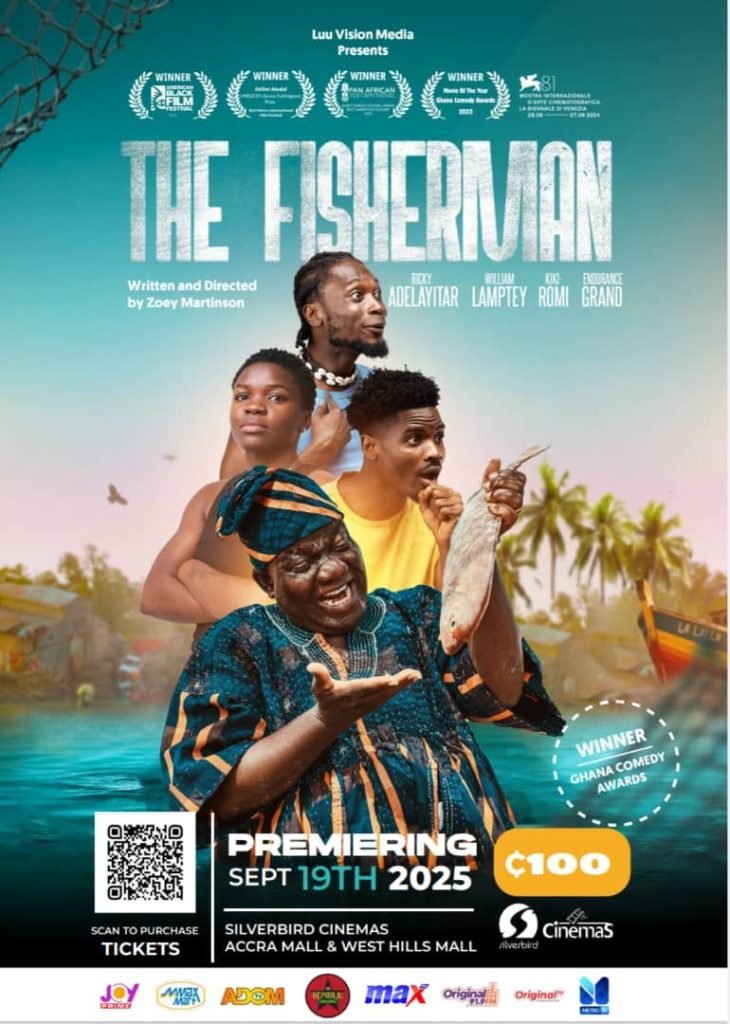Published
5 months agoon

There are a few movies that, in many ways, remind you of the prospects and potential of the Ghanaian film industry and its potential to tell stories anchored to our folklore while also tackling present-day themes and issues in an entertaining way. The newest film to add to this list for me is ‘The Fisherman‘, written and directed by Zoey Martinson.
The film is a fantasy comedy about an old Ghanaian fisherman who teams up with a talking fish and a trio of young dreamers for a purposeful trip to the capital to secure a loan that will help them buy their own boat.
Right from the jump, you can see how deliberate Zoey Martinson’s script is in reminding us of some of the traditions associated with work and life for fishermen in our coastal communities. The intention, I believe, is not just to highlight those traditions but also to ground the film’s fantastical elements in some measure of reality.
Atta Oko, played flawlessly by Ricky Adelayitor, is a man who has dreamed his entire life of becoming the community’s boat chief. He has worked tirelessly for years and cannot wait for the torch to be passed on to him. But when the time finally comes, he is overlooked, and the opportunity is handed instead to the outgoing chief’s (played by Fred Amugi) arrogant and dismissive son. The young man is armed with “book knowledge” but with no experience at sea or appreciation for the traditions that have sustained the trade for centuries.
Angered and disappointed by what he sees as disrespect, Atta Oko unexpectedly encounters a talking fish. He is convinced that this is not a chance event and that the fish, as per tradition, has a ‘message’ for him. Meanwhile, three young friends, Kobina (played by William Lamptey), Shasha and Emmanuel (played by Kiki-Romi), who are willing to take a chance, approach Atta Oko to help them form their own boat crew. Together, they journey to Accra in search of money to purchase a boat. As you would imagine, their journey and experiences in the capital become the heart of the story.
The themes this narrative explores are many, but none overshadows the other. The main anchor is the constant battle between tradition and modernisation. Atta Oko is seen as old-fashioned and out of touch with present times, and that perception drives much of the conflict. In Accra, he reconnects with his daughter Naa Oko (played by Adwoa Akoto), who lives comfortably off her wealthy boyfriend. This revelation shocks him and further strains their relationship. What unfolds is a subplot exploring the expectations fathers hold for their daughters, and the disappointment and betrayal they feel when those expectations clash with reality. This subplot is introduced in the early parts of the film, and as the narrative progresses, you see it grow into a much more detailed emotional beat in the final third. This adds more depth and drama to the film.
Another compelling theme is self-acceptance, highlighted through Shaha (played by DWP star Endurance “Grand” Dedzo). She struggles with gaining acceptance from her father because she wants to fit in with the boys and join them at sea, a choice tradition frowns upon. Throughout the narrative, we see Shaha have moments where she struggles with her identity and choices. She questions whether she must change or stay true to who she believes she is. Considering this as her first film appearance, Endurance Grand is exceptionally flawless in the role, embodying Shaha with both precision, emotional honesty and balance.
Generally, the performances in this film across the board are strong. Not a single actor feels out of place or underdelivers. Ricky Adelayitor is particularly the perfect lead, carrying Atta Oko with a humorous charm shrouded in the dignity of an elder. If he has never had a true moment to shine throughout his illustrious career, this would be it. He delivers Atta Oko with such conviction that the audience roots for him and his quest to become boat chief until the very end.
Another standout is Abdulazeem Dulo Harris, who voices the talking fish, which Atta Oko humorously names Koobi (Salted Tilapia). The fish is a blend of comic vitriol and surprising nuggets of wisdom, providing plenty of laughs while hinting at a deeper, almost divine existence with a message for the troubled fisherman. The fish brings a good dose of humour in this film, but it’s all well measured and doesn’t upstage the other characters. My disappointment, however, was the narrative’s failure to dive into the folklore of the ‘talking fish’, especially in the Ghanaian context, that is, if there is indeed any such folklore. I believe some additional clarity on the ‘how and why’ the fish was that special would have presented another weighty theme that would be appreciated by some viewers.
The film’s pacing works well with its comedic beats. None of the scenes feel unnecessary or drawn out, and the tone is lighthearted. I can’t describe it as a slapstick comedy with exaggerated humour. Instead, the balance between reality and fantasy creates a world perfectly suited for humour, much of it delivered through witty dialogue and playful banter.
Also, the cinematography, colouring, and visual effects deserve credit for shaping this vibrant world where reality and fantasy gel well together. Every detail feels deliberate, from the visuals to the subtle commentary on the challenges affecting Ghana’s fishing industry. The harmful effects of plastic waste, the creeping influence of technology and social media, and how these pressures test our cultural and traditional values. The film does condemn but doesn’t judge outright. Instead, it creates awareness and sparks conversation in a creative, artistic way. Hopefully, it does that, especially with the Ghanaian audience.
Overall, ‘The Fisherman‘ carries a certain refinement that again highlights the potential of the Ghanaian film space. A potential I glimpsed in several other productions, but hope to see become the standard across the board.
You might want to watch it simply for the laughs, but it’s truly a film you must see. A Ghanaian story worth rallying behind and supporting. I will score The Fisherman 8.3/10. As entertaining as its comedy is, it also resonates emotionally. 
If you doubt me, go give ‘The Fisherman’ a chance as it premieres at Silverbird Cinemas, this Friday, 19th September 2025, with tickets going for 100 GHC.
Second on my list of addictions is Movies.. the only thing I could possibly love more is my Dearest Waakye lol. Nothing else does a better job of reminding me that ANYTHING is possible with the right amount of effort. I have great eye for details and flaws in scripts. Shallow scripts bore me. I am an avid reader. Your everyday Mr Nice guy. Always the last to speak in a room full of smart people. Half Human, half Martian but full MOVIE FREAK.














